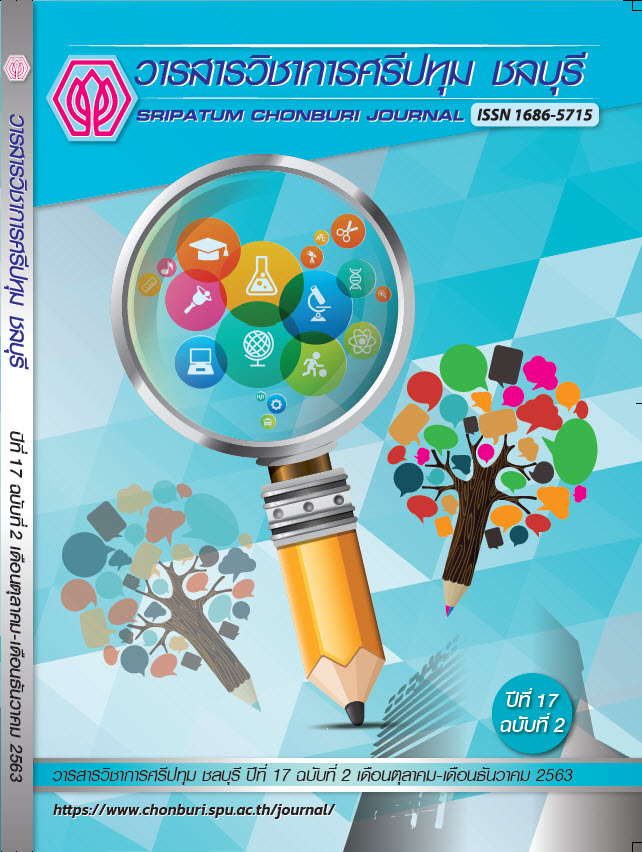INSTRUCTIONAL ABILITY USING THE INSTRUCTIONAL GUIDELINES FOR PROMOTING STUDENTS’ SELF-LEARNING OF GRADE 5 TEACHERS AT SCHOOLS UNDER THE NAKHON NAYOK PRIMARY EDUCATIONAL SERVICE AREA OFFICE
Keywords:
self-learning, instructional guideline handbook, instructional ability, the Nakhon Nayok Primary Educational Service Area Office.Abstract
The purposes of this research were: 1) to develop an instructional guideline handbook for promoting students’ self-learning for teachers, 2) to investigate the instructional ability of teachers using the instructional guidelines handbook for promoting students’ self-learning, and 3) to study teachers' teaching knowledge before and after learning the instructional guideline handbook for promoting students’ self-learning. The population of this research was science teachers in grade 5 at schools under the Nakhon Nayok Primary Educational Service Area Office in the second semester, academic year 2019. The sample size was 45 teachers, which were selected based on Multi Stage Sampling. The research instruments were: 1) the instructional guideline handbook for promoting students’ self-learning for teachers, 2) instructional ability evaluation scale, and 3) teaching knowledge evaluation scale. Data were analyzed using statistics, including mean (), standard deviation (SD) and One Sample t-test.
The results of this research indicated that: 1) the suitability of the developed instructional guideline handbook was at the high level with a mean of 4.48, consisting of the following phases: Phase 1 was Instructional Planning and Designing; Phase 2 was Practice; Phase 3 was Feedback; and Phase 4 was Sharing, 2) the instructional ability of teachers for promoting students’ self-learning was at the high level with a mean of 4.06, and 3) the pretest score of teachers was 21.23 meanwhile the posttest score was 31.80. When the pretest and posttest scores were compared, after learning the instructional guideline handbook for promoting students’ self-learning, the posttest score of teachers was higher than the pretest score with a statistical significance level of .05.
References
บุปผชาติ ทัฬหิกรณ์. (2561). การประยุกต์ใช้ ICT ตามแนวคิด Constructionism (ออนไลน์). เข้าถึงได้จาก: http://www.ku.ac.th/icted2003/document/bupphachart.ppt [2563, 25 มกราคม].
ประพันธ์ศิริ สุเสารัจ. (2556). การพัฒนาการคิด (พิมพ์ครั้งที่ 5). กรุงเทพฯ: เทคนิค พริ้นติ้ง.
พระราชบัญญัติการศึกษาแห่งชาติ (ฉบับที่ 4) พ.ศ. 2562. (2562, 1 พฤษภาคม). ราชกิจจานุเบกษา. เล่ม 136 (ตอนที่ 57 ก), หน้า 49-53.
วิรัช วรรณรัตน์. (2539). การวัดและประเมินผลการศึกษา. กรุงเทพฯ: สำนักทดสอบทางการศึกษาและจิตวิทยา มหาวิทยาลัยศรีนครินทรวิโรฒ ประสานมิตร.
สุชิน เพ็ชรรักษ์. (2544). รายงานการวิจัยเรื่อง การจัดกระบวนการเรียนรู้เพื่อสร้างสรรค์ด้วยปัญญาในประเทศไทย. กรุงเทพฯ: โรงพิมพ์องค์การค้าของคุรุสภา.
อานันท์ สีห์พิทักษ์เกียรติ. (2553). รายงานการศึกษาวิจัย รูปแบบการพัฒนาการเรียนรู้โดยผ่านเครื่องคอมพิวเตอร์พกพา. กรุงเทพฯ: โรงพิมพ์องค์การค้าของคุรุสภา.
Griffin, Jean M. (2017). Constructionvism and de-constructionism: Opposite yet complementary pedagogies. Constructivist Foundations, 14(3), pp. 234-243.
Downloads
Published
Issue
Section
License
บทความทุกบทความเป็นลิขสิทธิ์ของวารสารวิชาการศรีปทุม ชลบุรี



